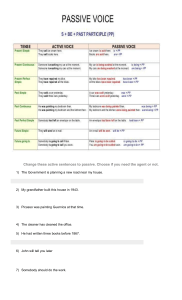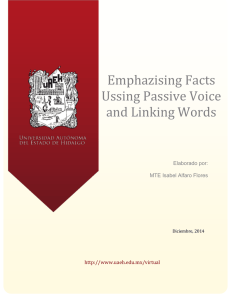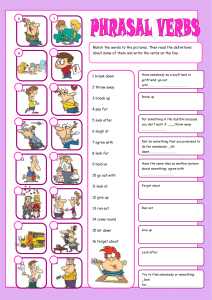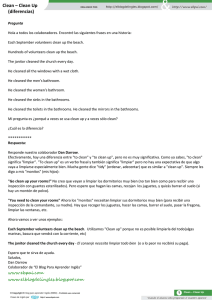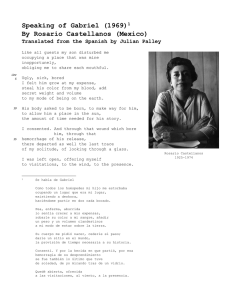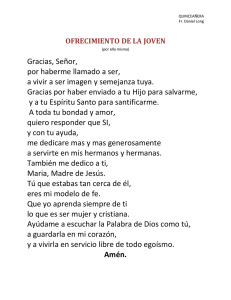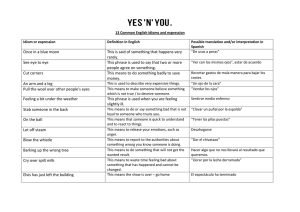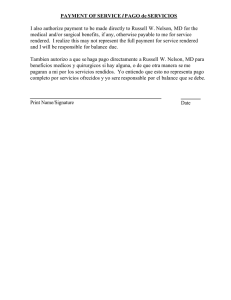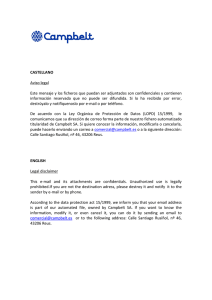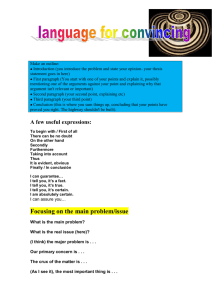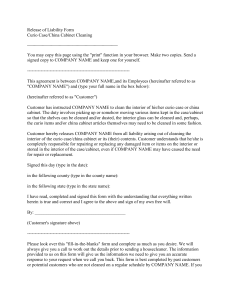en otra ventana
Anuncio
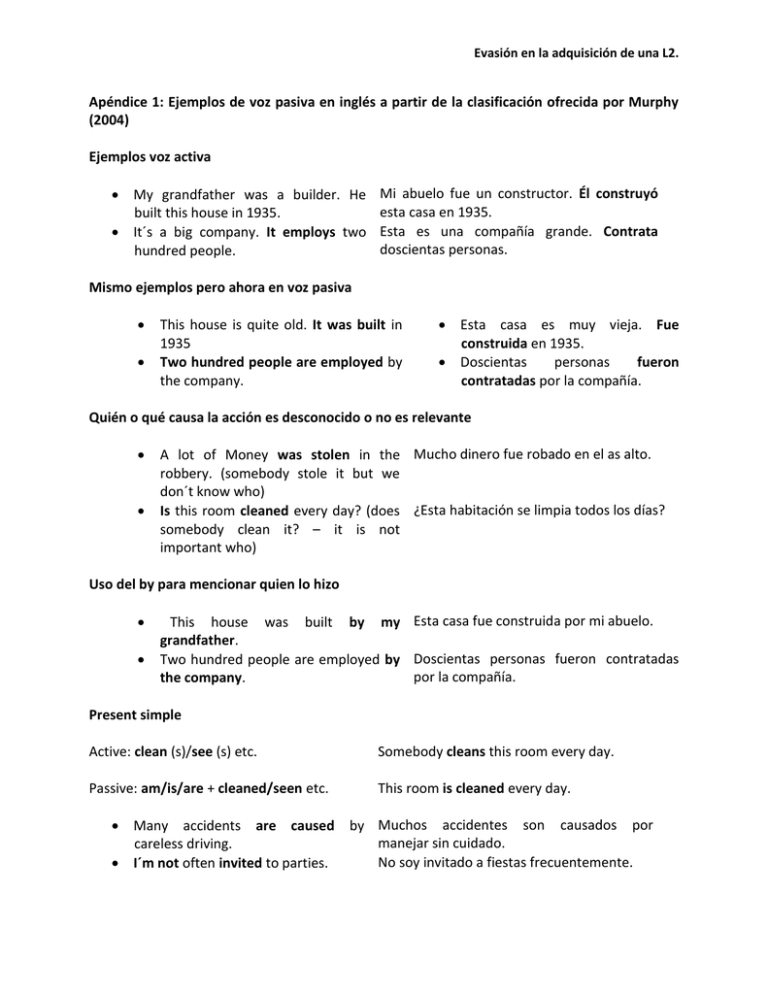
Evasión en la adquisición de una L2. Apéndice 1: Ejemplos de voz pasiva en inglés a partir de la clasificación ofrecida por Murphy (2004) Ejemplos voz activa My grandfather was a builder. He built this house in 1935. It´s a big company. It employs two hundred people. Mi abuelo fue un constructor. Él construyó esta casa en 1935. Esta es una compañía grande. Contrata doscientas personas. Mismo ejemplos pero ahora en voz pasiva This house is quite old. It was built in 1935 Two hundred people are employed by the company. Esta casa es muy vieja. Fue construida en 1935. Doscientas personas fueron contratadas por la compañía. Quién o qué causa la acción es desconocido o no es relevante A lot of Money was stolen in the Mucho dinero fue robado en el as alto. robbery. (somebody stole it but we don´t know who) Is this room cleaned every day? (does ¿Esta habitación se limpia todos los días? somebody clean it? – it is not important who) Uso del by para mencionar quien lo hizo This house was built by my Esta casa fue construida por mi abuelo. grandfather. Two hundred people are employed by Doscientas personas fueron contratadas por la compañía. the company. Present simple Active: clean (s)/see (s) etc. Somebody cleans this room every day. Passive: am/is/are + cleaned/seen etc. This room is cleaned every day. Many accidents are caused by Muchos accidentes son causados por manejar sin cuidado. careless driving. No soy invitado a fiestas frecuentemente. I´m not often invited to parties. Evasión en la adquisición de una L2. How is this word pronounced? ¿Cómo se pronuncia esta palabra? Past simple Active: cleaned/saw etc. Somebody claned this room yesterday. Passive: was/were + cleaned/seen etc. This room was cleaned yesterday. We were woken up by a loud noise during the night. 'Did you go to the party?' 'No, I wasn´t invited'. How much money was stolen in the robbery? Fuimos despertados por un ruido fuerte durante la noche. ‘¿fuiste a la fiesta?’ ‘no, no fui invitado’. ‘¿Cuánto dinero fue robado?’ Infinitive Active: (to) do/clean/see etc. Somebody will clean the room later. Passive: (to) be + done/cleaned/seen etc. The room will be cleaned later. The situation is serious. Something must be done before it´s too late. A mystery is something that can´t be explained. The music was very loud and could be heard from a long way away. A new supermarket is going to be built next year. Please go away. I want to be left alone. Perfect infinitive La situación es seria. Se debe hacer algo antes de que sea demasiado tarde Un misterio es algo que no se puede explicar. La música estaba muy fuerte y se podía escuchar desde lo lejos. El próximo año se va a construir un supermercado nuevo. Por favor váyanse/vete. Quiero que me dejen sola. Active: (to) have + done/cleaned/seen etc. Somebody should have cleaned the room Passive: (to) have been+done/cleaned/seen The room should have been cleaned etc. I haven´t received the letter yet. It Aun no he recibido la carta. La debieron might have been sent to the wrong haber enviado a la dirección equivocada. address. If you hadn´t left the car unlocked, it Si no hubieras dejado el carro abierto, no Evasión en la adquisición de una L2. wouldn´t have been stolen. se lo hubieran robado. There were some problems at first, Al principio hubo algunos problemas, pero al parecer ya se resolvieron. but they seem to have been solved. Present perfect Active: have/has been + done etc. Passive: have/has been done etc. Have you heard? The concert has been cancelled. Have you ever been bitten by a dog? ‘Are you going to the party?’ ‘No, I haven´t been invited’ The room looks nice. Somebody has cleaned it. The room looks nice. It has been cleaned. ¿Escuchaste/has escuchado? El concierto ha sido cancelado/se cancelo el concierto. ¿Alguna vez te ha mordido un perro? ‘Vas a ir a la fiesta?’ ‘No, no he sido invitado/no me han invitado’. Past perfect Active: had + done etc. Passive: had been + done etc. The vegetables didn´t taste very good. They have been cooked too long. The car was three years old but hadn´t been used very much. The room looked nice. Somebody had cleaned it. The room looked nice. It had been cleaned. Los vegetales/las verduras no sabían muy bien. Las cocinaron demasiado tiempo/fueron cocidas demasiado tiempo. El carro tiene años pero no se ha utilizado/usado mucho. Present continous Active: am/is/are + (do)ing Passive: am/is/are + being (done) There´s somebody walking behind us. I think we are being followed. (in a shop) ‘Can I help you?’ ‘No, thank you. I´m being served’. Somebody is cleaning the room at the moment. The room is being cleaned at the moment. Hay alguien caminando detrás de nosotros. Creo que nos están siguiendo. (enuna tienda) ‘¿Le puedo ayudar en algo?’ ‘No gracias, ya me están atendiendo’. Past continous Active: was/were + (do)ing Somebody was cleaning the room when I Evasión en la adquisición de una L2. Passive: was/were + being (done) arrived. The room was being cleaned when I arrived. There was somebody walking behind Había alguien caminando detrás de nosotros. Estábamos siendo seguidos/ nos us. We were being followed. estaban siguiendo. I was offered…/we were given… etc. Active: Somebody gave the police the (=somebody gave the information to the information police) Passive: The police were given the information The information was given to the police Verbos que pueden llevar dos objetos: Ask, offer, pay, show, teach, tell I was offered the job, but I refused it. (=they offered me the job) You will be given plenty of time to decide. (=we will give you plenty of time) Have you been shown the new machine? (=has anybody shown you?) The men were paid £400 to do the work. (=somebody paid the men £400) Me ofrecieron un empleo pero lo rechace. (=ellos me ofrecieron el trabajo) Se te va a dar mucho tiempo para decidir. (=te daremos mucho tiempo) ¿Ya te/ya le mostraron la maquina nueva? (¿=alguien ya te la/se la mostró?) A los hombres se les pagó £400 para que hicieran el trabajo (=alguien les pagó a los hombres £400) I don´t like being… Active: I don´t like people telling me what to do Passive: I don´t like being told what to do I remember being taken to the zoo when I was a child. (=I remember somebody taking me to the zoo) Steve hates being kept waiting (=he hates people keeping him waiting) Recuerdo que me llevaban al zoológico cuando era niño (=recuerdo a alguien llevándome al zoológico) Steve odia que lo tengan esperando (=él odia que la gente lo haga esperar/lo tenga esperando) Evasión en la adquisición de una L2. We managed to climb over the wall Conseguimos subir encima de la barda sin without being seen (=without ser visto (=sin que nadie viéndonos) anybody seeing us) I was born… En inglés se dice ‘I was born…’ (no I am born). I was born in Chicago. Where were you born? (not where are you Past born?) Pero How many babies are born many day? Present Get Se puede usar en vez de be: There was a fight at the party, but nobody got hurt. (=nobody was hurt). I don´t often get invited to parties. (=I´m not often invited) I´m surprised Liz didn´t get offered the job. (=Liz wasn´t offered the job) Por ejemplo, no se puede utilizar get en las siguientes oraciones porque las cosas no pasan: Jill is liked by everybody. (not gets liked – this is not a ‘happening’) He was a mystery man. Very little was known about him. (not got known) También se usa get en las siguientes expresiones (las cuales no son pasivas en su significado): get married, get divorced get lost (=not know where you are) get dressed (=put on your clothes) get changed (=change your clothes)
